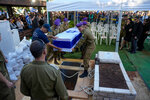

RAFAH, Gaza Strip (AP) — International mediators appeared to make progress Wednesday on extending the truce in Gaza, encouraging Hamas militants to keep freeing hostages in exchange for the release of Palestinian prisoners and further relief from Israel's air and ground offensive. The cease-fire will otherwise end within a day.
Two Russian-Israeli women freed by Hamas entered Israel Wednesday evening, the military said. The release was expected to be followed by the swap of 10 more hostages in Gaza for 30 Palestinian prisoners held by Israel.
Israel has welcomed the release of dozens of hostages in recent days and says it will maintain the truce if Hamas keeps freeing captives. But it also says it is committed to its other major goal — the annihilation of the armed group that has ruled Gaza for 16 years and orchestrated the deadly attack on Israel that triggered the war.
“After this phase of returning our abductees is exhausted, will Israel return to fighting? So my answer is an unequivocal yes,” he said. “There is no way we are not going back to fighting until the end.”
He spoke ahead of a visit to the region planned this week by U.S. Secretary of State Antony Blinken to press for further extensions of the truce and hostage releases.
Weeks of heavy aerial bombardment and a ground invasion have demolished vast swaths of northern Gaza and killed thousands of Palestinians. But it seems to have had little effect on Hamas' rule, evidenced by its ability to conduct complex negotiations, enforce the cease-fire among other armed groups, and orchestrate the smooth release of hostages.
Yehya Sinwar and other Hamas leaders have likely relocated to the south, along with hundreds of thousands of displaced Palestinians who have packed into overflowing shelters.
An Israeli ground invasion of the south could eventually ferret out Hamas' leaders and demolish the rest of its militant infrastructure, including miles of tunnels, but at a cost in Palestinian lives and destruction that the United States, Israel's main ally, could be unwilling to bear.
The Biden administration has told Israel that if it resumes the offensive it must operate with far greater precision, especially in the south. That approach could make it more difficult to bring Hamas to its knees any time soon, and international pressure for a lasting cease-fire is already mounting.
“How far both sides will be prepared to go in trading hostages and prisoners for the pause is about to be tested, but the pressures and incentives for both to stick with it are at the moment stronger than the incentives to go back to war,” Martin Indyk, a former U.S. ambassador to Israel, wrote on X.
Diaa Rashwan, head of Egypt’s state information services, said negotiations to extend the cease-fire and release more hostages have made progress and that it is “highly likely” another extension will be announced Wednesday. Egypt, along with Qatar and the U.S., played a key role in mediating the original cease-fire and a two-day extension announced Monday.
Blinken, who plans to visit the region this week, said the U.S. would like to see an extension of the truce, the release of more hostages, and the delivery of more humanitarian aid to Gaza.
Speaking to reporters in Brussels, he said he also wanted to discuss postwar arrangements for Gaza, a subject on which the U.S., Israel and Arab countries are deeply divided.
The war began with Hamas' Oct. 7 attack into southern Israel, in which it killed over 1,200 people, mostly civilians. The militants dragged some 240 people back into Gaza, including babies, children, women, soldiers, older adults and Thai farm laborers.
Israel responded with a devastating air campaign across Gaza and a ground invasion in the north. More than 13,300 Palestinians have been killed, according to the Hamas-controlled Health Ministry in Gaza, which does not differentiate between civilians and combatants.
Israel says 77 of its soldiers have been killed in the ground offensive, and it claims to have killed thousands of militants.
The plight of the captives, and the lingering shock from the Oct. 7 attack, has galvanized Israeli support for the war. But Prime Minister Benjamin Netanyahu is also under intense pressure to bring the hostages home, and could find it difficult to resume the offensive if there's a prospect for more releases.
Israel said Wednesday that around 160 hostages are still being held in Gaza, including four who are under 18 and 10 who are over 75. With information hard to come by, authorities have only given approximate counts of the number of hostages held in Gaza.
There appear to remain enough to potentially extend the current cease-fire for another two weeks. Israel did not say how many of the captives are soldiers, for whom Hamas is expected to drive a much harder bargain.
The cease-fire is currently due to end at some point after an exchange planned for later on Wednesday.
A total of 60 Israelis have been freed as part of the truce, most of whom appear physically well but shaken. Another 21 hostages — 19 Thais, one Filipino and one Russian-Israeli — have been released in separate negotiations since the truce began. Before the cease-fire, Hamas released four hostages, and the Israeli army rescued one. Two others were found dead in Gaza.
The latest swap brought to 180 the number of Palestinians freed from Israeli prisons. Most have been teenagers accused of throwing stones and firebombs during confrontations with Israeli forces. Several were women convicted by Israeli military courts of attempting deadly attacks.